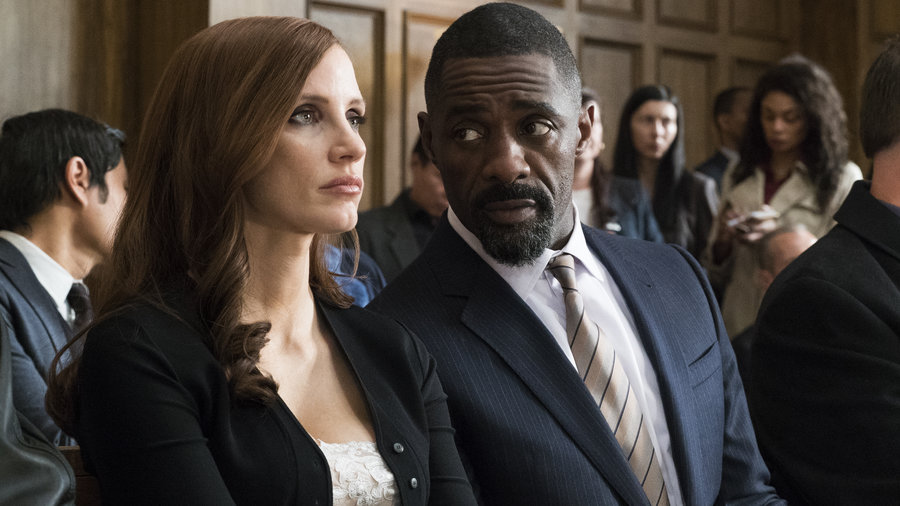
This one was written by Anna Nott.
If you haven’t seen the action/drama/thriller/hint of comedy that is Molly’s Game, I suggest that you stop reading this article, and investigate a way to watch it.
Spoilers to follow.
I have been a subscriber to MoviePass, i.e. I have access to unlimited movies in theaters (no more than one movie per day) for 10 bucks a month, since October. So far, Molly’s Game is the only film I’ve made a point of seeing twice.
Molly, played by the exquisite Jessica Chastain, is an Olympic skier for the U.S. women’s team, who, due to an unlucky fall on the slopes, is forced to trade in her skis for a new kind of career path. This new position turns out to be one in which Molly facilitates, or “runs,” high-stakes poker games for the elite in the most glamorous of cities: Los Angeles for eight years, then in Manhattan for two. It is through this, uh, career of choice that she carefully crafts a multi-million-dollar business for herself. This career path provides Molly with an absurdly high income that is, she makes sure, entirely legal, at least in the beginning. As one source describes, Molly’s Game is “a rare female-driven story of near-psychotic ambition, obsession, and vice that can stand alongside any sweat-drenched Scorsese hero” (Vulture).
In this film by Aaron Sorkin, Molly is the heroine, and greed is her vice. But she is aware of this vice, and begins to not recognize herself, her true self, because of it. She has managed to benefit from others’ vices of greed, while simultaneously being consumed by the same vice within. It is this dramatic irony that drives her to eventually break the law by “taking a rake.” A “rake” is the scaled commission fee taken by a cardroom or any establishment operating a poker game (Wikipedia). Because Molly doesn’t hold an issued permit to operate a cardroom, this one small decision causes her to dive headfirst into legal trouble. Concerning the vice of greed, Molly explains at one turning point in the film:
By this point I was running six games a week… [and] I was addicted to drugs… anything that could keep me up for a few days and knock me out for a few hours. But I wasn’t just taking them to stay awake anymore. It was dark and friendless where I was. I felt like I was in a hole so deep I could go fracking. It didn’t feel like depression, it felt more violent.
I was tired of living in the frat house I’d built for degenerates. I was tired of the greed — mine, not theirs. Everybody’s. I was sick of being high all the time, I was sick of only living in the dark.
Following this monologue, there is a scene where Doug Downey, a silly, drunken and kind-hearted frequenter of Molly’s poker games, confesses his love for her. When she denies him, as she does to these types of suitors, she explains:
Listen to me. Doug? I’m the woman all of you have always dreamed of. I’m the anti-wife. Instead of making you feel bad about going out every night and gambling, I encourage it. And instead of asking you to cut down on your drinking, I have drinks served to you by models who simultaneously create the impression that you’re the kind of guy who can score a dime piece anytime you want…
In this perverted patriarchal society in which Molly must exist, she has discovered how to win. But her winnings will only last so long; that is, up to the point when the Italian mob gets involved. It is only after a violent encounter with them that all $4 million from her personal account is seized by the IRS, she is tracked down and handcuffed in the basement of her home, and a document that reads United States vs. Molly Bloom is shoved in her face. A bit of fast-forwarding through his initial reluctance to become her lawyer and, ta-da: Idris Elba to the rescue!
While Elba tries to set her up to plead not-guilty, Molly stands firm and chooses to plead guilty. She refuses to accept any kind of plea-bargain that forces her to name anyone involved in her games, so as to focus strictly on her own wrongdoing: breaking the one law concerning taking a rake.
Aaron Sorkin’s film is so compelling due to the fact that Molly’s character is brilliant. Multiple times she shows grace to individuals who have wronged her, rather than seeking vengeance, or even justice, as some may rightly call it. Even when the cards are repeatedly stacked against her: as a woman running high stakes poker games in a man’s world, she goes the way of love, even when it means exposing herself, instead of the way of vengeance.
And despite her ways of grace, she still must reckon with her main downfall: greed. The judge overseeing her case is a good judge, one that lets her off with a merciful pardon: community service, a fine, and no entry to Canada (unfortunate).
“So if the Son sets you free, you will be free indeed.” John 8:36 ESV
“For it is by grace that you have been saved through faith. And this is not your own doing; it is the gift of God, not a result of works, so that no one may boast.” Ephesians 2:8-9 ESV
Molly, despite her money-motivated greed and over-the-top lifestyle, is given grace, and a way out, even though she pled guilty. The judge sets her free, just as Jesus sets us free, through His love for us.

COMMENTS
One response to “Grace in Molly’s Game”
Leave a Reply













????